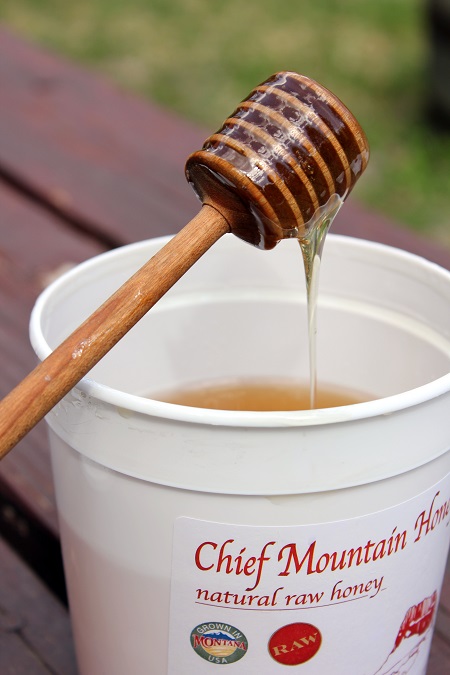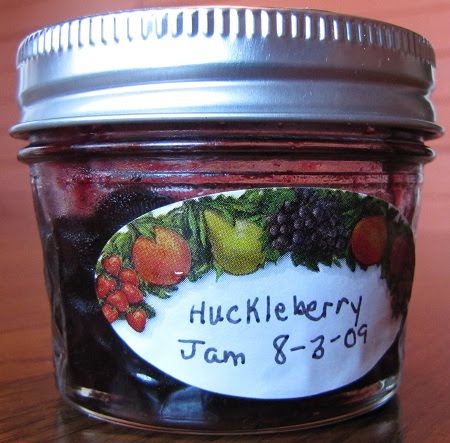Dads always seem to know everything, and recently I had a conversation with my dad in which he explained the benefits of consuming local raw honey. He said it was good for helping with allergies.
Prior to my conversation with Dad, I bought honey without giving it much thought. I had always purchased honey from a grocery store, or by the 5 pound jug at Costco. All I was interested in was Clover Honey to use as a sweetener in recipes, or for a home remedy for a sore throat. What my dad explained about local honey made sense, so I decided to do some additional research.
What I found out is that not only is raw honey a delicious sweet topping for your ice cream or biscuits, it has amazing medicinal properties as well.

My honey dipper was handcrafted by a local artisan.
Why Raw Honey is Good for You
Much of the honey on the average grocery store shelf is not raw, nor is it local. It has been pasteurized, processed, and heated in some way. It comes from far away places, and sometimes other countries. On the other hand, raw honey has not been processed in any way, leaving it pure and natural with all of the beneficial qualities nature intended. Even if it isn’t local, raw honey is better.
Raw honey contains essential vitamins, minerals, and enzymes, as well as powerful antioxidants, anti-viral, anti-fungal, and anti-bacterial properties; all valuable benefits to help keep you healthy.
That’s the basic scoop on raw honey, but what’s the advantage to local raw honey? Consuming local raw honey kicks it up a notch in the “beneficial to you” department!
Why Local Raw Honey is Even Better for You
Picture the little honey bee flying from flower to flower in search of nectar. A little here, a little there; and as it travels from plant to plant collecting nectar, it is also picking up sticky pollen spores which attach to its legs, wings, etc. Some of this pollen is deposited on flowers in the process of cross-pollination. And that’s a good thing. It helps the plants to thrive. But guess what? Some of it stays in the stomach, as well as on the body of the bee.
When the honeybee returns to the hive with a belly full of nectar, it regurgitates the nectar and pollen into its mouth. Enzymes break the liquid down into simple sugars, which the bee then spits into the honeycomb (some people consider this bee vomit). Honey bees later use this for food, or if a beekeeper is in the picture, the beekeeper comes and removes the honey found in the combs.*
What Does This Have to do With Local Raw Honey Being Good for You?
Local raw honey, (the closer in proximity to you, the better) has pollen in it that is specific to your locale and may help with seasonal allergies. The idea behind this is that eating local raw honey works like a vaccination. A spoonful or two of local raw honey each day for several weeks prior to allergy season is thought to help your body build up a tolerance to the allergens that make you suffer.The pollen is introduced into your body, which in turn triggers your immune system to go to work against these invaders. By the time allergy season arrives you have built up a natural defense against the triggers that cause your sneezing, sniffles, watery eyes, and stuffy nose.
A dose of honey sounds like a much sweeter deal than a visit to a doctor and the expense of pills.
_____________________

Montana Local Raw Honey
Soothing a sore throat with honey and lemon is just one of the ways to use this incredible natural food.
10 Benefits of Local Raw Honey
1. Considered to lower blood pressure
2. Helps stabilize blood sugar
3. When consumed before exercise, it increases performance and may aid in recovery, similar to a sports drink
4. Is a natural immune enhancer
5. Helps improve digestion
7. Topically heals wounds
8. Aids in relieving morning sickness
9. Works as a pimple fighter on mild acne
10. When applied as a salve, it can relieve eczema, bleeding gums, and canker sores.
Wow! So many beneficial uses! Other than using honey and lemon to soothe a sore throat, I have not used raw honey for any of these ailments, and cannot vouch for its efficacy. But I have started buying local raw honey and it is always good to know that nature has provided us with a wealth of natural healing aids.
_____________________
sources for this article: Wake Up World, Healthy Eating, How Stuff Works
*After reading this, you may be asking, what does the bee eat, if the beekeeper steals its food? The beekeeper replaces the honey in the comb with sugar or corn syrup. If you’re feeling sorry for the honeybees, considering all of the hard work they had to do to collect the nectar to make their honey, this article may make you eschew using honey at all!
_________________________
You may like:




